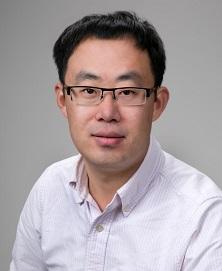
Hao Su, the City College of New York mechanical engineer developing a lightweight and adaptive exoskeleton, is the recipient of a National Science Foundation (NSF) CAREER Award. It will provide more than $552,000 in funding over five years for his proposal entitled: “Versatile Wearable Robots for Rehabilitation of Children with Gait Disabilities.”
“The goal of this research and education integrated CAREER plan is to understand human-robot bidirectional adaptation by studying modeling, sensing, and control of assistive robots to enhance mobility and health of children with gait impairments,” said Su, assistant professor in CCNY’s Grove School of Engineering.
“Powered exoskeletons are typically heavy and resistive to human movements and lack real-time intention awareness and individualized control,” he added. “State-of-the-art wearable robots are based on series elastic actuators that have to compromise compliance to improve bandwidth. The proposed work will leverage on electric motor technologies developed by the PI to bridge these gaps. We have developed learning-based controllers to enable the robust performance of the robot in the real-world that involves changing gaits and varying terrain conditions. Our ultimate goal is to make wearable robots available for every child who needs it everywhere.”
This project is in collaboration with Diane Damiano and Tom Bulea of the NIH Clinical Center.
The NSF honor is another recognition of Su’s pioneering work. Last fall, he received a $1.3 million grant from the U.S. Department of Health and Human Services to advance his work on a hybrid soft exoskeleton that combines the advantages of rigid exoskeletons and textile-based exosuits to overcome lower-limb impairments, particularly in seniors. The grant will establish the Center of Assistive and Personal Robotics for Independent Living (APRIL) in the Grove School.
In 2018, Su and his fellow researchers were finalists in the second stage of a $4 million mobility challenge. Their entry, “Physiology-Adaptive and Computer Vision-Assisted Soft Exoskeletons to Support Independent Living across the Continuum of Rehabilitation,” placed in the top 10 among 96 entries globally in the first round.
For more information about Su’s exoskeleton, visit the Grove School’s Biomechatronics and Intelligent Robotics Lab that he directs.
About the NSF CAREER Program
NSF’s Faculty Early Career Development (CAREER) Program is a Foundation-wide activity. It offers the NSF’s most prestigious awards in support of early-career faculty who have the potential to serve as academic role models in research and education and to lead advances in the mission of their department or organization. Activities pursued by early-career faculty should build a firm foundation for a lifetime of leadership integrating education and research.
About the City College of New York
Since 1847, The City College of New York has provided a high-quality and affordable education to generations of New Yorkers in a wide variety of disciplines. CCNY embraces its position at the forefront of social change. It is ranked #1 by the Harvard-based Opportunity Insights out of 369 selective public colleges in the United States on the overall mobility index. This measure reflects both access and outcomes, representing the likelihood that a student at CCNY can move up two or more income quintiles. In addition, the Center for World University Rankings places CCNY in the top 1.2% of universities worldwide in terms of academic excellence. Labor analytics firm Emsi puts at $1.9 billion CCNY’s annual economic impact on the regional economy (5 boroughs and 5 adjacent counties) and quantifies the “for dollar” return on investment to students, taxpayers and society. At City College, more than 16,000 students pursue undergraduate and graduate degrees in eight schools and divisions, driven by significant funded research, creativity and scholarship. CCNY is as diverse, dynamic and visionary as New York City itself. View CCNY Media Kit.